
- Homepage
- Base Metal
- .925 (4)
- 14k Gold Finish (2)
- 925 Parts Per 1000 (25)
- 925 Silver (3)
- 925 Sterling Silver (35)
- 925 White Silver (82)
- Brass (2)
- Fine Silver (21)
- Gold (15)
- Mixed Metals (4)
- Silver (201)
- Sterling Silver (950)
- Sterling Silver 925 (2)
- Sterling Sliver (46)
- White Gold (4)
- Yellow Gold Plated (2)
- 925 (10)
- ... (4153)
- Item Length
- Main Stone
- Metal
- .925 Sterling Silver (13)
- 925 Silver (2)
- 925 Sterling Silver (89)
- Brass (5)
- Fine Silver (8)
- Gold (5)
- Gold Over Silver (2)
- Mixed Metals (5)
- Silver (253)
- Silver Plated (3)
- Sterling Silver (3864)
- Sterling Silver .925 (4)
- Sterling Silver 925 (4)
- Unknown (3)
- White Gold (4)
- White Gold Plated (41)
- Yellow Gold (27)
- Yellow Gold Flashed (2)
- Yellow Gold Plated (34)
- ... (1193)
- Plating
- Shape
10.05 Ct Brilliant Round Cut Diamond Vintage Tennis Bracelet 14K Yellow Gold FN
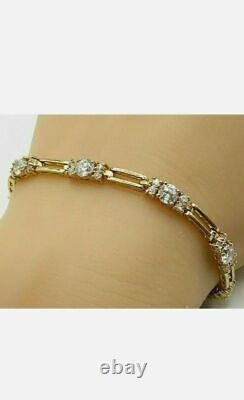
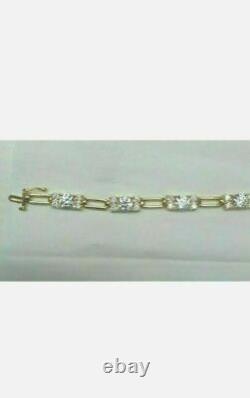
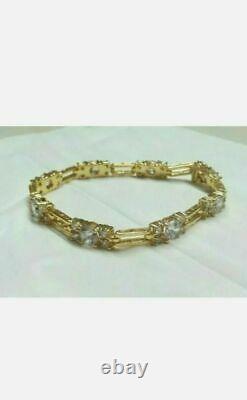
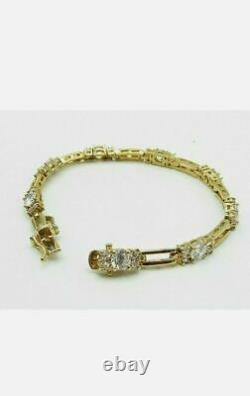
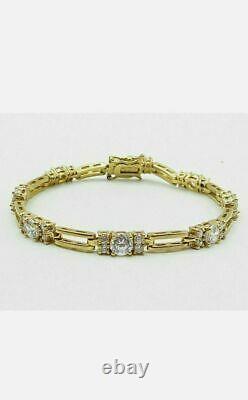
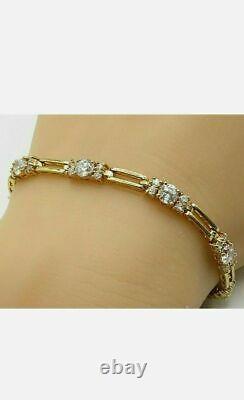
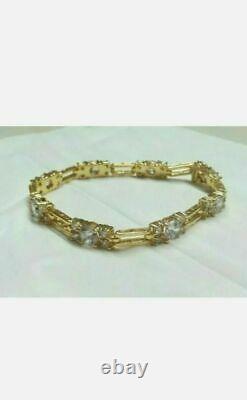
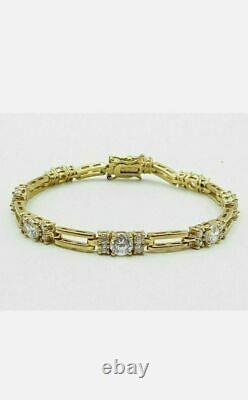


Choosing a diamond for the one you love can be magical, meaningful and stressful all at the same time. Our guide to the 4Cs of diamonds includes the traditional four: Cut, Clarity, Color and Carat weight.
Whether your taste is classic and traditional or more modern and contemporary, our guide will help you find the perfect shape diamond for your personality. Proportion, angle and cut placement make each diamond unique. This quick overview gives you the basics of your diamond's anatomy. The setting you choose allows you to show off your diamond safely and securely. From a traditional four-prong setting to a diamond-lined basket and even a protective bezel setting, this guide will help you choose the setting style that suits your busy lifestyle.Icy and elegant, diamonds mined in northwest Canada have a sparkle and scintillation all their own. Lucifer diamond Arctic Brilliance diamonds are perfectly cut and hand-set with great care. Each diamond is independently certified and includes a Certificate of Authenticity. We take the issue of conflict diamonds very seriously.
The Signet family of fine jewelers is part of the Kimberley Process Certification Scheme (KPCS), ensuring its diamonds are from conflict-free sources. You can learn more about our Conflict-Free Diamond Commitment here. There's nothing quite like a diamond. It's not only the hardest substance on earth, it's also the most brilliant. And the diamond has been a sparkling symbol of love since the 1400s.
What diamond shape is right for you or the one you love? What shape is the most popular? Which shapes are classic and which are contemporary? Our guide to diamond shapes will help you find the perfect diamond to fit her personality. Whether you choose a traditional prong setting or a modern bezel, the setting you choose allows you to show off your diamond safely and securely - and lets it brilliantly shine.
This guide will help you choose the setting type that beautifully reflects your personality and lifestyle. Your fine jewelry pieces are both financial and emotional investments. Caring for your diamond, gemstone and pearl jewelry will not only keep them looking great, but will ensure that they will last for generations to come. All fine jewelry needs proper care. While certain pieces may need select care, most jewelry should be cared for using the following basics. Just like the sun damages skin, heat and light can damage certain gemstones. Too much sunlight can fade or damage amethyst and topaz. Pearls can bleach and peel if exposed to too much sun. And certain other gems, like opal, can darken if exposed to too much light. To remove any doubt, store jewelry in a dark pouch or jewelry case. Exposure to common everyday household chemicals, like ammonia or bleach, can damage both metals and gemstones. Even chemicals that are worn on the body - like hairspray, perfumes and lotions - can affect metals and dull gemstones. To keep your jewelry looking new, it's best to put on any perfumes, lotions or hairspray BEFORE putting on jewelry.And it's always wise to remove fine jewelry before swimming or using any type of household cleaners. Many gemstones today have been treated, and these gemstones need special care. Treated gemstones may be negatively affected by heat, steam or ultrasonic cleaners and certain solvents. Follow instructions from your jeweler to keep your treated gemstone jewelry looking sparkling.
While ultrasonic cleaners are great for cleaning metals, diamonds and certain gemstones, they should not be used in the following circumstances. On organic gems like pearls, coral or. Any gemstones that have been fracture-filled with oil, resin or glass. For instance, most emeralds are fracture-filled and should not be cleaned in an ultrasonic cleaner. Gems that have been coated. For instance, Mystic Fire Topaz have been finished with an azotic coating and should not be cleaned in an ultrasonic cleaner. Any gemstones that are susceptible to heat or temperature changes, like tanzanite, iolite, opal, etc.Should not be cleaned in an ultrasonic cleaner. Safe and Easy Cleaning Methods. Gemstones and diamonds can easily be cleaned with warm water, mild dish soap and a soft brush. Clean your jewelry in a bowl of warm soapy water and rinse thoroughly. Dry your piece with a lint-free cloth.
Softer gems, like pearls, can be scratched easily. Clean your pearls in warm, slightly soapy water, with a very soft brush. Rinse thoroughly and lay your pearls to dry on a towel or chamois. Since silk thread will stretch, it's best to let the pearls sit until the strand is completely dry. Proper storage of your fine jewelry pieces is very important.
Diamond, gemstone and especially pearl jewelry should never simply be tossed into a drawer or box haphazardly as they may be scratched unintentionally. Most jewelry pieces come in a lined box or pouch that is perfectly acceptable for storage. However, most people use a jewelry box or valet to store their pieces. Jewelry boxes that have individual felt-lined and padded slots for rings, necklaces and earrings will keep them organized, clean and safe. Some boxes are lined with anti-tarnish cloth, perfect for storing sterling silver pieces.
Pearls and opals draw moisture from the air, so storing them in a safe or lockbox is not a good idea. Store pearls separately in a compartmentalized jewelry box or in a protective pouch. However, the very best way to keep pearls looking new is to wear them. Pearls will naturally absorb moisture from the air and oils from the skin, which keep them looking lustrous.
The saying that "pearls want to be worn" is true! With relatively minimal effort, your fine jewelry pieces can be cleaned, well-cared for, safely stored and provide years and years of happy wear.
Classic, elegant and always sophisticated, pearls have always been one of the most popular and meaningful gifts. Often given to mark a milestone moment - like a Sweet 16th birthday, graduation day, Mother's day or a wedding day gift from the groom to the bride - pearl jewelry is timeless and will be well-treasured. Pearls are also the traditional birthstone for those born in June, and the gemstone for the 30th wedding anniversary.Given the speed in which things seem to happen today, it is almost incongruous to find that pearls have been cultured and harvested basically the same way for centuries. The creation of a pearl is remarkably simple to understand, but fairly complex to create. Pearls are formed when an irritant, such as a piece of sand, becomes lodged in the shell of an oyster. Sensing the object, the oyster deposits layers of a semi-translucent substance called "nacre" around the intruder, where it builds up over time. It takes years to create a pearl of decent size and perfectly round shapes are rare.
This means that while they are genuine pearls made from natural materials, the pearls themselves are cultivated in pearl farms and the process is overseen and facilitated by humans. The Four Types of Pearls. There are four major types of cultured whole pearls. And they differ in color, size and shape based on the variety of the mollusk, the growing conditions, harvesting techniques and many other factors.This item is in the category "Jewelry & Watches\Fine Jewelry\Bracelets & Charms".diamonds" and is located in this country: US.
This item can be shipped worldwide.- Country of Origin: United States
- Total Carat Weight: 10.00 ctw & Over
- Colored Diamond Intensity: Fancy
- Main Color: 14K Yellow Gold Finish
- Personalize: Yes
- Type: Bracelet
- Secondary Stone: Diamond
- Seller Warranty: Yes
- Main Stone Color: White
- Color: Yellow
- Occasion: Anniversary, Birthday, Christening, Christmas, Confirmation/Communion, Engagement, Father's Day, Graduation, Mother's Day, Valentine's Day
- Brand: Princsschoicejewelry
- Era: Undated
- Main Stone Shape: Round
- Shape: Round
- Handmade: Yes
- Country/Region of Manufacture: United States
- Style: Tennis
- Base Metal: Sterling Silver
- Diamond Clarity Grade: Very, Very Slightly Included (VVS1)
- Gemstone Clarity Grade: Eye Clean
- Setting Style: Channel-Set
- Material: Stone
- Theme: Beauty
- Cut Grade: Excellent
- Features: Adjustable, Engraved
- Charm Type: Traditional
- Item Length: 7 in
- Main Stone Treatment: Not Enhanced
- Metal Purity: 925 Parts Per 1000
- Main Stone: Diamond
- Sizable: Yes
- Wholesale: Yes
- Main Stone Creation: Lab-Created
- Metal: Sterling Silver
- Diamond Color Grade: D

